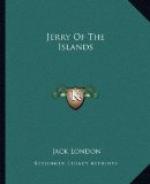The smoke columns along the heights became garrulous, and long before the Arangi was through the passage the entire leeward coast, from the salt-water men of the shore to the remotest bush villagers, knew that the labour recruiter was going in to Langa-Langa. As the lagoon, formed by the chain of islets lying off shore, opened out, Jerry began to smell the reef-villages. Canoes, many canoes, urged by paddles or sailed before the wind by the weight of the freshening South East trade on spread fronds of coconut palms, moved across the smooth surface of the lagoon. Jerry barked intimidatingly at those that came closest, bristling his neck and making a ferocious simulation of an efficient protector of the white god who stood beside him. And after each such warning, he would softly dab his cool damp muzzle against the sun-heated skin of Skipper’s leg.
Once inside the lagoon, the Arangi filled away with the wind a-beam. At the end of a swift half-mile she rounded to, with head-sails trimming down and with a great flapping of main and mizzen, and dropped anchor in fifty feet of water so clear that every huge fluted clamshell was visible on the coral floor. The whaleboat was not necessary to put the Langa-Langa return boys ashore. Hundreds of canoes lay twenty deep along both sides of the Arangi, and each boy, with his box and bell, was clamoured for by scores of relatives and friends.
In such height of excitement, Van Horn permitted no one on board. Melanesians, unlike cattle, are as prone to stampede to attack as to retreat. Two of the boat’s crew stood beside the Lee-Enfields on the skylight. Borckman, with half the boat’s crew, went about the ship’s work. Van Horn, Jerry at his heels, careful that no one should get at his back, superintended the departure of the Langa-Langa returns and kept a vigilant eye on the remaining half of the boat’s crew that guarded the barbed-wire rails. And each Somo boy sat on his trade-box to prevent it from being tossed into the waiting canoes by some Langa-Langa boy.
In half an hour the riot departed ashore. Only several canoes lingered, and from one of these Van Horn beckoned aboard Nau-hau, the biggest chief of the stronghold of Langa-Langa. Unlike most of the big chiefs, Nau-hau was young, and, unlike most of the Melanesians, he was handsome, even beautiful.
“Hello, King o’ Babylon,” was Van Horn’s greeting, for so he had named him because of fancied Semitic resemblance blended with the crude power that marked his visage and informed his bearing.
Born and trained to nakedness, Nau-hau trod the deck boldly and unashamed. His sole gear of clothing was a length of trunk strap buckled about his waist. Between this and his bare skin was thrust the naked blade of a ten-inch ripping knife. His sole decoration was a white China soup-plate, perforated and strung on coconut sennit, suspended from about his neck so that it rested flat on his chest and half-concealed the generous swell of muscles. It was the greatest of treasures. No man of Malaita he had ever heard of possessed an unbroken soup-plate.




